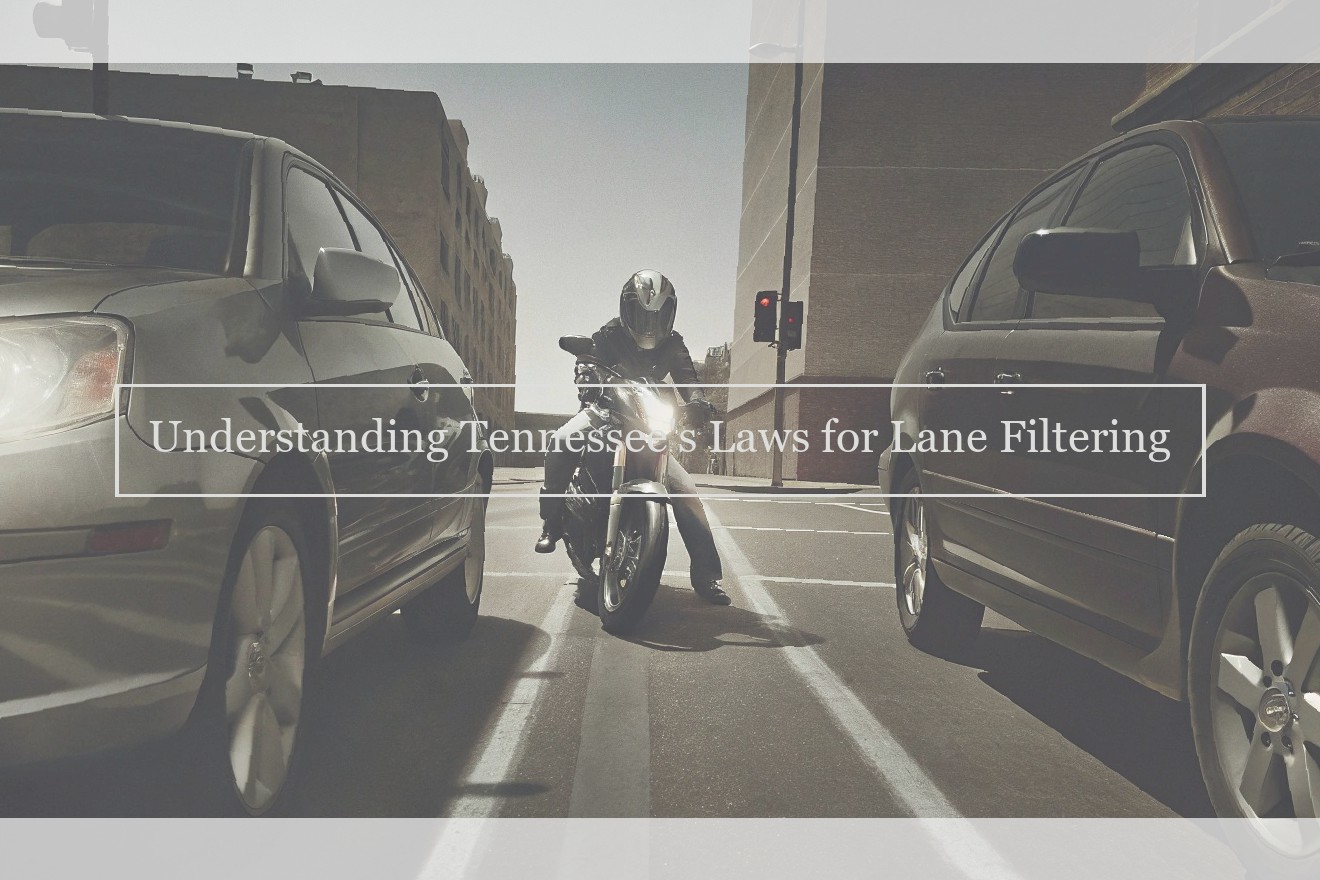Lane Filtering Defined
Lane filtering is a practice where a motorcycle moves more toward the front of a line for a stop by moving between all of the cars in that line. Using this practice has become common when encountering traffic at a light, at least in some jurisdictions. Lane filtering is different from both lane splitting and lane sharing, the latter of which is often confused with lane splitting .
Lane splitting is where a biker weaves between lanes when proceeding down the road, while lane sharing involves a biker riding down the road without lane changes or other evasive moves, but in a straight line next to a car, that is, legally or illegally sharing the lane. Lane splitting is illegal in all 50 states, while lane sharing is legal in all 50 states, and lane filtering may be legal or illegal in some jurisdictions. The reason the names are similar is that some law enforcement won’t distinguish between the two, and language in some states combines both forms.
Current Status of Lane Filtering Under Tennessee Law
The legal position on lane filtering in Tennessee is quite straightforward. Tennessee traffic regulations currently prohibit the practice as a matter of law. Motorists who drive in the so-called "middle ground" are subject to stiff fines, citations, and potential suspension of their licenses.
Let’s take a look at the law as it exist in Tennessee. Section 55-8-160(a) of the Code states, "It is an offense to drive a motor vehicle on any roadway . . . in a manner that begins to leave the roadway but does not cross at least a portion of the right-of-way of the roadway. . . ." In layman’s terms, this means any vehicle (motorized or otherwise) that is using a roadway in an attempt to travel in a forward direction may only do so by remaining on the roadway – on the right side, if possible.
Implied in the above code is an exception for emergency vehicles, which are entitled to operate on roadways as necessary to respond to accidents, fires, explosions, and other similar public emergencies.
Beyond this exception for emergency vehicles, there is no exception to Tennessee traffic laws that would permit lane splitting legally. Thus, motorcycle operators whose bikes straddle the buffer zone of traffic, effectively causing their bikes to cross both lanes of traffic, are violating this code section.
The law also makes it clear that the ability to safely navigate the roadway without leaving any section of the roadway is expected of all motorists. "All vehicles must be driven within a single lane unless it is not safe to do so," it states.
Failure to follow this law is a Class C misdemeanor, which means you’ll likely be facing a fine between $50 and $500, depending on whether you have prior violations. A repeat violation may also bring with it a citation for reckless driving.
Legal Implications of Lane Filtering in Tennessee
As of today, the law does not provide for any language which allows lane filtering. In other words, motorcyclists should not expect to be protected from a lawsuit if they are involved in an accident while lane filtering. As well, riders face additional exposure for violating the statute because the conduct involved would not fall under the provisions of the good Samaritan law for "assistance at the scene of a motor vehicle accident," T.C.A. Sec. 29-34-211.
Motorcyclists who are involved in accidents while lane filtering in Tennessee can be held at least partially liable in almost all circumstances. Lane splitting is a bit different than lane filtering. Lane splitting is never permitted in Tennessee. That’s because lane splitting requires the motorcyclist to move between lanes in a manner that creates a legal traffic hazard. A motorcycle that travels to the right of a stopped or slow moving vehicle moving in the same direction causes legal injury to a driver operating in the far right lane in two ways:
A motorcyclist’s right to lane splitting is almost certainly going to be for naught unless the legislature passes a law allowing it. Motorcyclists should understand their rights and restrictions when taking their bikes out on the roads in Tennessee.
Recent Legislative Changes and Proposed Changes
While the lane filtering issue has been relatively quiet in Tennessee for the last few years, there have been a few recent legislative proposals that indicate lane filtering remains a controversial topic in the state legislature. Some of them are aimed at simply banning the practice altogether. House Bill 865, introduced by Rep. Sargent on Feb. 16, 2021, and Senate Bill 330, introduced by Sen. Hensley on Feb. 19, 2021, outright criminalize the act of lane filtering regardless of whether it results in an accident or traffic violation. This stands in contrast to the motorcycle lane filtering legislation that has been enacted in other states, where restrictions apply only when filtering creates a reckless or hazardous condition. Another recent proposal by the Tennessee General Assembly suggests that they want to grant some form of legal protection to motorcyclists who are pulled over by law enforcement while lane filtering. House Bill 689, introduced by Rep . Hawk on Feb. 16, 2021, would require the driver of an "authorized emergency vehicle" to provide details to the Department of Safety and Homeland Security within 30 days. If they fail to do so, the bill provides immunity against civil damages in any subsequent action that arises from the incident. While it’s completely plausible that this bill was only meant to protect first responders who are enforcing traffic laws, it could also provide more permissive circumstances under which motorcyclists can filter. After all, if lane filtering were deemed an acceptable practice, such that ticketing a motorcyclist for lane splitting resulted in civil damages to the officer, then incentivizing officers to pull over lane filtering bikers would not make much sense. On the other hand, the purpose of the bill could simply be to allow law enforcement agencies to save face for any instances in which they may be forced to settle a lawsuit related to improper lane filtering.
Comparison with Surrounding States
Tennessee’s neighboring states also have different views on lane splitting and filtering. Virginia’s Statutes allow motorcycles to ride in between lanes of traffic whenever a vehicle is stopped. Alabama however prohibits lane filtering by motorcyclists except in a small group of cars or trucks. Georgia does not expressly allow or prohibit lane filtering but allows motorcycles to share lanes in traffic when it becomes gridlocked. Florida’s laws are closely related to Tennessee’s, although the Florida law allows motorcycle lane filtering within 15 miles of an intersection. Mississippi has no specific laws on lane splitting or filtering. Arkansas does not have an express law on lane splitting, perhaps while traffic laws are under review as a result of a recent appellate court decision. Kentucky allows lane splitting but has a six foot width limit on the area for motorists to split. Tennessee’s lane filtering requirements definitely are different from the laws in surrounding states. Although Tennessee provides that motorcycle riders may pass vehicles in congested traffic situations, the laws do not explicitly provide for "lane splitting" between lanes of travel. In addition, the speed and distance limit is shorter than some of the states to Tennessee’s north. The common denominator with all the states is a prohibition on lane splitting at speeds over 25 miles per hour.
Safety Implications of Lane Filtering in Tennessee and Recommendations
Beyond the legality of lane filtering, there are significant safety concerns to address. The procedure itself is fraught with potential hazards as unsuspecting drivers fail to account for oncoming motorcyclists traveling between cars in a traffic line. Lane splitting has been shown to result in increased fatalities for motorcyclists. The most at-risk individuals involved in lane filtering events are pedestrians and those within three feet of motorcyclists on roadways. Accidents have occurred not only from the motorcycle colliding with a vehicle, but with motorcycles striking pedestrians or other objects . The practice of lane filtering represents an evolution in motorcycle riding, inspired by the growing number of motorcyclists in traffic-congested cities. However, the risks associated with lane splitting are unlikely to dissipate in the near future. Such risks are particularly acute in Tennessee, where lane filtering laws are not on the books. Riders should be especially wary of an incident until terminology is added to the state statute to define the differences between filtering and splitting. Even when such language is in place, the safest course of action is still to eschew lane filtering entirely. Those who choose to ignore this word of caution are encouraged to be especially mindful of the turns of passing motorists, cyclists, and pedestrians.




+ There are no comments
Add yours